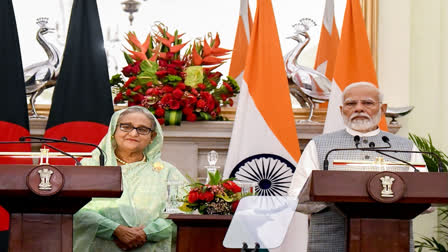Nobel laureate Muhammad Yunus took over as the head of Bangladesh's caretaker government on Thursday, August 8, after Prime Minister Sheikh Hasina, New Delhi's staunchest ally, succumbed to protests and resigned on August 5, 2024, and left the country for India. With the possibility of the presence of the Bangladesh Nationalist Party (BNP) and Jamaat-e-Islami (JeI) a banned terrorist organisation in the interim government, an anti-Indian interim regime can put a strain on the New Delhi-Dhaka relationship despite the fact that the BNP coming to power after next elections and perhaps Khaleda Zia were to take over as head of Bangladesh.
This probable change will obviously be a significant setback to India's security strategy in waning India's regional influence in the South Asian region. For India, the security calculus with Bangladesh is viewed through connectivity, refugee risks, terror activities, the Bay of Bengal and military cooperation.
Connectivity
Bangladesh shares a 4,096 km border with India, which is located to provide India easier access to West Bengal and northeast states Assam, Meghalaya, Mizoram, Tripura, West Bengal and as well as to the Bay of Bengal to ameliorate its trade and connectivity. A disorder in ties with Dhaka could hamper the existing road routes permitting to use of the territory of Bangladesh and agreements for using Chittagong and Mongla ports to transport goods to northeastern states and delay the Agartala-Akhaura cross-border rail link launched in November 2023. Moreover, "Chicken’s Neck" (Siliguri Corridor) is a vital narrow passage connecting the Indian mainland to the northeastern region. Any interruption and commotion in this tactically sensitive area hits hard on India's strategic leverage by segregating the region from the mainland, making it susceptible to face potential security threats.
Refugee Risks
There is an intense risk of infiltration across the border with Bangladesh, Hasina’s followers seeking refugee status and political asylum in India and moreover, particularly by minority Hindus, who may feel unsafe under the new government could lead to an impact on local politics and security. In response to the instability in Bangladesh, Meghalaya has imposed a night curfew along its international border and the Border Security Force (BSF) has increased its vigilance along the border to prevent unauthorised crossings.
Terrorism
Counter-terror cooperation is a key facet of the relationship between India and Bangladesh as militant groups hostile to India are operating in Bangladesh using a geographically disadvantaged northeast region. Besides, India is subject to cross-border terrorism from groups based in Pakistan, and these groups use Bangladesh as a transit point into India.
Hasina's regime implemented a 'Zero Tolerance' policy towards terrorism and cracked down on anti-India elements. Dhaka maintained close cooperation with New Delhi in terms of intelligence sharing and also entered an Extradition Treaty with India in 2013. Many times, Bangladesh has arrested and handed over activists of the United Liberation Front of Asom (ULFA) to India.
During the regime of Khaleda Zia (1991-1996 and 2001-2006), Bangladesh supported Pakistan and promoted Inter-Services Intelligence (ISI) sponsored militant groups to enter to attack or escape through Bangladesh after the terror attacks. The BNP-JeI coalition government facilitated ISI to assist the terror groups of the Northeast like ULFA, National Socialist Council of Nagaland (NSCN), and All Tripura Tiger Force (ATTF) through the supply of arms, financial assistance, technical assistance and in sending insurgents to travel to Pakistan from Dhaka for training in guerrilla warfare.
The current flux in Bangladesh and probable BNP-JeI government with the support of ISI provides a fertile ground for the above groups and Bangladeshi terror outfit Harkat-ul-Jihad-al-Islami (HuJI) tied with Pakistani militant organisations to regroup and receive support could reignite terrorism in the northeast. Moreover, Tareque son of Zia has close ties with ISI and terror operatives including ULFA chief Paresh Baruah and Dawood Ibrahim will definitely pose a danger to the internal security of India.
